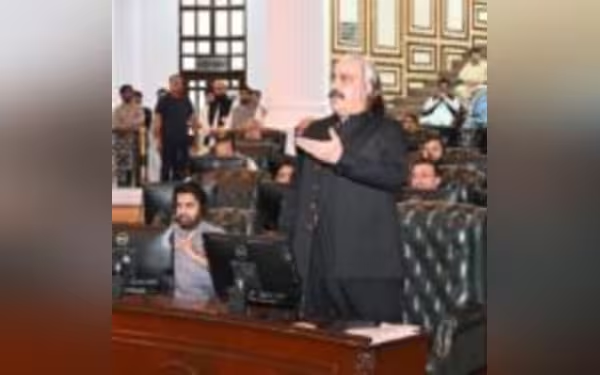Sunday, December 22, 2024 02:04 AM
Gandapur Warns Government of Armed Resistance Consequences
- Gandapur condemns violence against peaceful protesters.
- He warns government of potential armed resistance.
- Calls for justice and release of political leaders.
 Image Credits: pakistantoday
Image Credits: pakistantodayGandapur warns the government of consequences if protesters resort to armed resistance amid ongoing political tensions in Pakistan.
Khyber Pakhtunkhwa (KP) Chief Minister Ali Amin Gandapur has recently made headlines by condemning the violence against peaceful protesters in Islamabad. This situation has drawn comparisons to past tragic events in Pakistan, such as the Anarkali and Model Town incidents. Gandapur's remarks came during a speech before the K-P Assembly session, where he expressed deep concern over the treatment of innocent civilians during the recent protests at D-Chowk.
In his address, Gandapur emphasized that the government’s actions were not just isolated incidents but part of a troubling pattern of violence against those who peacefully express their political views. He offered prayers for the souls of party workers who lost their lives during these protests, highlighting the emotional toll this violence has taken on families and communities.
Gandapur accused the government of permitting military intervention in civilian protests, citing Section 245 as a legal cover for such actions. He pointed out that protesters had been fired upon at various locations, including Dadokhel and Chungi No 26, while they were simply demonstrating for the release of their imprisoned leader, former Prime Minister Imran Khan.
During his speech, Gandapur also raised concerns about a microphone malfunction that disrupted his address, suggesting that it might have been a deliberate attempt to silence him. This claim adds a layer of intrigue to the already tense political atmosphere in the country.
He challenged the opposition by asserting that the recent march in support of Imran Khan was the largest in Pakistan's history, claiming that no previous protest had seen such a massive turnout. "We will not let the blood of our workers go in vain," he declared, making it clear that those responsible for the violence would be held accountable.
Gandapur did not shy away from issuing a stern warning to the government, stating that they should fear the consequences if the people were pushed to resort to armed resistance. He asserted, "We have weapons, ammunition, and money too. They should fear the day when we take up arms." This statement underscores the escalating tensions between the government and the protesters, raising concerns about the potential for further violence.
In light of the ongoing political crisis and security issues, Gandapur reiterated his party’s commitment to justice and freedom. He emphasized that they would not settle for mere power but would continue to fight for dignity and sovereignty. "This Red Zone does not belong to anyone in particular; it belongs to all of us," he stated, reinforcing the idea that the struggle for rights and justice is a collective effort.
Gandapur’s remarks reflect a hardline stance against the government’s crackdown on protests. His call for the release of party workers and political leaders, along with an end to what he described as politically motivated violence, resonates with many who feel marginalized in the current political landscape. As the situation unfolds, it remains crucial for all parties involved to seek peaceful resolutions and prioritize dialogue over violence, ensuring that the voices of the people are heard and respected.













